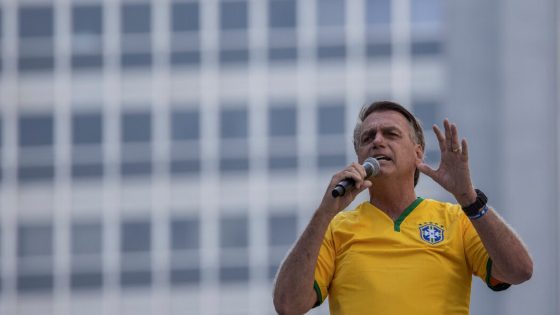Brazil’s federal police recommended that former President Jair Bolsonaro be criminally charged in a scheme to embezzle jewelry he received as gifts from foreign leaders while president, according to two people close to the investigation, adding another major legal challenge for Mr. Bolsonaro.
The federal police accused Mr. Bolsonaro and 10 of his allies of trying to keep and sell expensive gifts that he received from foreign governments, said the people, who spoke on the condition of anonymity to describe sealed case files. The police are seeking money laundering and criminal association charges against Mr. Bolsonaro and some of his allies, including former aides.
In one case, Mr. Bolsonaro and his team sought to conceal $1 million worth of diamond jewelry that the former president received from the Saudi Arabian government, according to past investigative documents.
In another, Mr. Bolsonaro’s team tried and failed to sell an 18-karat gold set from the Saudis for $50,000 at a Manhattan auction house during a Valentine’s Day sale last year, the documents show. In a third, they sold two luxury watches at a Pennsylvania mall for $68,000 and delivered some of the cash to Mr. Bolsonaro, the documents show.
While Brazilian police call such recommended charges an “indictment” in Portuguese, Mr. Bolsonaro has not been charged. The country’s top federal prosecutor must now decide whether to charge Mr. Bolsonaro and force him to stand trial. That prosecutor and Brazil’s Supreme Court said they had not yet received the recommendations from police as of Thursday night.
The case is part of mounting legal jeopardy for Brazil’s former president, just 18 months since he left office.
In March, the federal police recommended charges against Mr. Bolsonaro for a scheme to falsify his Covid-19 vaccination records, though federal prosecutors have yet to charge him.
In February, the police seized his passport and ordered him to remain in Brazil as they investigated his role in what the authorities say was a conspiracy to hold onto power after he lost the 2022 election. Days later, Mr. Bolsonaro spent two nights at the Hungarian embassy in Brazil’s capital in an apparent bid to seek asylum, according to security camera footage obtained by The New York Times.
If he is convicted in any of the cases, the former president could face prison time. Legal experts view the accusations of a coup plot to be the most likely to lead to prison time if convicted, while convictions in the jewelry or vaccine-card cases could result in lighter sentences. Former presidents are not immune from prosecution in Brazil.
Mr. Bolsonaro has denied the accusations and called the investigations political persecution. He and his lawyer have argued that the gifts were legally his property. “All former presidents had problems” with foreign gifts, Mr. Bolsonaro told the Brazilian newspaper Estadão last year. “The law is confusing.”
His lawyer declined to comment because he had not yet seen the documents recommending the charges.
Mr. Bolsonaro has long embraced comparisons to former President Donald J. Trump, and while the two men share combative political styles and far-right politics, they also increasingly share similar legal challenges.
Mr. Trump, who has been convicted in one case and indicted in three others, has also been accused of mishandling foreign gifts he received as president. House Democrats accused the Trump White House of not properly documenting more than 100 foreign gifts collectively worth more than $250,000. Nearly all of those gifts have now been accounted for.
In Brazil, the jewelry case began in 2021 when a Brazilian government official was caught returning from an official visit from Saudi Arabia with roughly $1 million worth of undeclared diamond jewelry. The official told the authorities that the items were a gift from Saudi officials for Mr. Bolsonaro and his wife, Michelle.
In June 2022, Mr. Bolsonaro’s personal aide, Lt. Col. Mauro Cid, sold a diamond Rolex watch and a Patek Philippe watch to a jewelry shop at the Willow Grove Park mall in Pennsylvania, according to investigative documents. Police believe one watch was a gift from Saudi Arabia and the other a gift from Bahrain.
Police recommended charges against Mr. Cid in that case. Mr. Cid had previously signed a plea deal with authorities. His lawyer has said that Mr. Cid was following orders from Mr. Bolsonaro, which Mr. Bolsonaro denies.
Brazilian law allows for presidents to keep some gifts if they are of a personal nature, but they should not be of a high value, according to Bruno Dantas, the head of Brazil’s watchdog court, the effective auditor of the federal government. “If it’s a diamond necklace with the president’s name on it, he can’t have that,” Mr. Dantas told The Times last year.
To decide what is a president’s property and what belongs to the state, a government-appointed panel sometimes weighs in. That panel ruled that at least some of the jewelry Mr. Bolsonaro’s aides sought to sell was of a personal nature.
Paulo Cunha Bueno, Mr. Bolsonaro’s lawyer, has said that means the jewelry is legally Mr. Bolsonaro’s. “He can sell them,” Mr. Cunha Bueno told The Times last year. “And if he dies, the assets go to his heirs.”
The head of the government-appointed panel was among those accused by the police of criminal association. The Brazilian Supreme Court judge overseeing the investigation had previously said some evidence suggested Mr. Bolsonaro ordered the panel to rule that the jewelry was his property.
Police have said that other evidence shows Mr. Bolsonaro and his allies sought to conceal their scheme. They operated mostly in cash, for instance. In one exchange on WhatsApp, Mr. Cid told an associate that his father had $25,000 for the former president. “He would deliver it by hand,” he said. “The less movement in the account, the better, right?”
After Mr. Dantas of the watchdog court ordered Mr. Bolsonaro to return the jewelry last year, Frederick Wassef, Mr. Bolsonaro’s former lawyer, flew to Pennsylvania and repurchased the Saudi Rolex for $49,000, the police said.
Mr. Wassef later denied that to the Brazilian press. “I’ve never seen that watch,” he told the Brazilian news site G1 last year. “I dare you to prove it.”
News sites then published the receipt with his name on it.
In an interview, Mr. Wassef denied ever saying he had not seen the watch.
The police this week recommended that Mr. Wassef also be charged with money laundering and criminal association.
Mr. Wassef said this week that Mr. Bolsonaro had not asked him to buy the Rolex. He said he had done it on his own accord while on a trip to the United States to return it to the federal government, as the courts had requested. “I am going through all of this solely for practicing law in defense of Jair Bolsonaro,” he said.
Paulo Motoryn contributed reporting from Brasília.
Source Agencies



